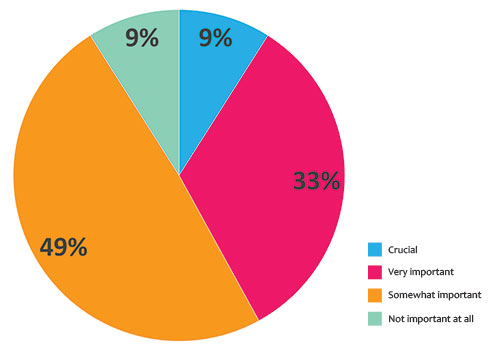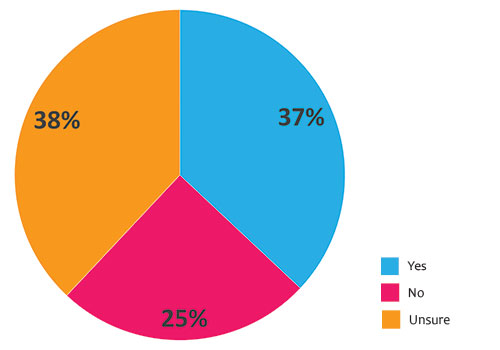Summary
91% of in-house counsel surveyed for this report felt that it was important that their external advisers kept abreast of new technologies. Despite there being a common recognition that it is an important factor, nearly as many in-house counsel reported that they didn't know if their external providers were implementing technology to deliver their legal solutions as those that answered that they were.
The pressure on general counsel to innovate could be having a trickle-down effect on the external legal advisers they instruct.
The overwhelming majority - 91% - of in-house counsel surveyed for this report felt that it was important that their external advisers kept abreast of new technologies.
'It is absolutely essential,' said Gábor Kukovecz, head of legal and operations at Diageo. 'The baseline is that we must be able to communicate very effectively with our external law firms. This requires that they use state-of-the-art communication and cloud-based collaboration software. In the near future, we will implement a collaboration software in which we work together with our external law firms that they must also fully implement.'
Despite there being a common recognition that it is an important factor, nearly as many in-house counsel reported that they didn't know if their external providers were implementing technology to deliver their legal solutions (36%) as those that answered that they were (40%). Just 37% felt satisfied with the use of technology by external firms; 25% were not satisfied, and 38% were unsure.
As the conversation around alternative fee structures and the traditional firm-client relationship continues, many in-house counsel made the point that there is no reason that their efforts to reduce costs and increase efficiency via technology shouldn't be replicated by their external counterparts. After all, in a number of ways, the GC is to the law firm as the business is to the GC - which is to say, the GC is the client and it should be incumbent on the firm to provide the best value for money.
'Clients are no longer willing to pay for high numbers of billable hours when they are aware that many tasks can be done faster and cheaper,' opined Tobiasz Adam Kowalczyk, head of legal at Volkswagen Poznan.
'Paralegals and associates who once devoted hours for document review can be now easily replaced by e-discovery processes. In a constant pursuit for efficiency and optimisation, clients expect more for less, which has made the legal market even more competitive. Fresh players have entered the market, providing clients with automated and cost-cutting solutions. I see automation as the way forward, making projects smarter and more efficient. Legal automation won't be un-invented, and - eagerly or not - more and more firms will need to adopt it out of necessity.'
How important is it that your external law firms keep abreast of new technologies?

There are also rewards to be reaped in terms of collaboration. The initiatives taken by external firms can serve as a useful model for in-house teams trying to create efficiencies of their own.
'External firms must have technological systems updated in order to provide us with the most modern solution and to share it with our internal legal team,' said Ana Soriano, head legal counsel at Inveravante.
Not everyone is as bullish on technology, however. To some, the use of technology is mostly smoke compared to other, softer competencies.
Are you satisfied with the use of technology by your external law firms?

'The improvement I actually want from law firms is not based in technology,' said Ruth Pearson, general counsel of LendInvest. 'I'd be far more inclined to instruct a firm that could demonstrate an investment in understanding their clients - for example, by hiring non-lawyers to improve their commercial acumen and understanding of what drives their clients, moving away from billable hours to a client-focused incentive structure, understanding risk appetite and being able to advise within those parameters, than a firm that thinks it can demonstrate technological innovation.'
'I prefer a good lawyer not using tech to a bad lawyer using tech,' stated the general counsel of one large French manufacturing company.
When asked if the question of technology arises when undertaking a panel review of external advisers, just 35% said that it was a factor, while the majority (41%) said it wasn't a factor at all. With panels becoming narrower and more deliberate all the time, the points on which firms differentiate themselves will take on an increasing importance. Given GC's evident interest in the use of technology by external firms, this factor may grow in significance in the near future.
'Depending on the jurisdiction and the business activity being undertaken, it is of moderate importance,' said the group counsel of one global engineering company. 'However, in the selection of lead counsel for C-suite-led matters, it has moved to the forefront of selection criteria.'




